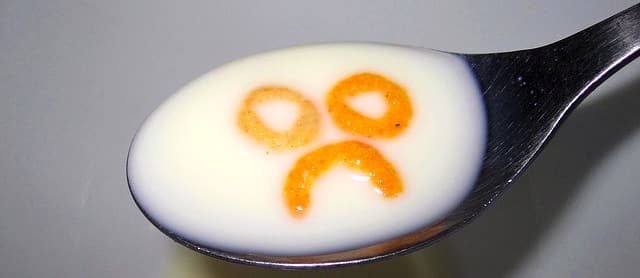Evolution devised an ingenious way to bond infant to mother: proteins in milk that break down into peptides that have opiate-like drug effects. But what if a breastfeeding mother is herself effectively suckling by still drinking milk into adulthood? Evolution never counted on that, which may explain a recent case report entitled “Cow’s Milk-Induced Infant Apnea With Increased Serum Content Of Bovine Beta Casomorphin 5” published in the Journal of Pediatric Gastroenterology and Nutrition.
Casomorphin is one of the opioid compounds formed in our stomachs when we drink milk. Infant apnea refers to when a baby stops breathing. The researchers “report a case of a breast-fed infant with recurrent apnea episodes, which have always been preceded by his mother’s consumption of fresh cow’s milk.” Lab tests revealed a high level of casomorphin in the child’s blood, leading researchers to speculate that it was the “opioid activity that may have a depressive effect on the respiratory center in the central nervous system and induce a phenomenon called milk apnea.”
“The aim of the present report,” the paper concludes, “is to draw researchers’ attention to the possibility of occurrence of a systemic reaction with an apnea seizure on the infant’s exposure to the proteins in cow’s milk. We are convinced that such a clinical situation occurs rarely; however, it is accompanied by a real threat to the infant’s life that can be avoided when applying a simple and not costly dietetic intervention…[a dairy-free diet]”. You can see more about the report in my 3-min. video Cow’s Milk-Induced Infant Apnea.
The reason this is so concerning is that as many as 1 in 10 infants with recurrent apneic episodes cannot be saved and die of SIDS, sudden infant death syndrome (also known as crib death). SIDS is the leading cause of death for healthy infants after one month of age. One in every two thousand American babies dies this way. Every day six babies stop crying and twelve parents start.
The suggestion that the opiate-like effects of a protein in cow’s milk could cause an infant to stop breathing was so provocative that researchers have started testing other high-risk kids. In my 2-min. video, Cow’s Milk Casomorphin and Crib Death, I detail a study in which the blood levels of the morphine-like peptides from cow milk averaged three times higher in infants with acute life-threatening episodes than those in healthy infants. It turns out there is an enzyme that gets rid of casomorphins, but the activity of that enzyme in the affected group was only half that of the healthy kids. Thus, some babies may just not be able to clear it out of their systems fast enough and are placed at risk for SIDS. The researchers conclude: “Penetration of beta-casomorphins into the infant’s immature central nervous system may inhibit the respiratory center in the brainstem leading to abnormal ventilatory responses, hypercapnia [too much carbon dioxide], hypoxia [not enough oxygen], apnea, and death.”
The opiate-like casomorphins liberated from the cow’s milk protein, casein, are also accused of participating in the cause of other conditions including type I diabetes, postpartum psychosis, circulatory disorders, food allergies, and autism–the subject of my 2-min. video Cow’s Milk Casomorphin and Autism.
Breast is always best, but the breast milk of women eating plant-based diets may be better still since they not only reduce or eliminate exposure to bovine casomorphins, but also contain lower levels of industrial pollutants like dioxins. For other effects animal products may have on healthy development see Dairy & Sexual Precocity. No wonder Dr. Spock—the most esteemed pediatrician of all time—ended up recommending children be raised without exposure to meat and dairy.
-Michael Greger, M.D.
